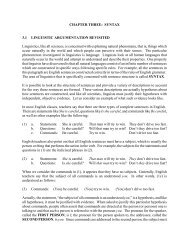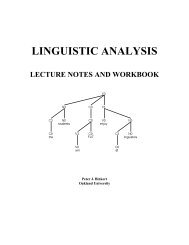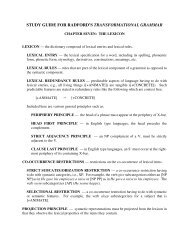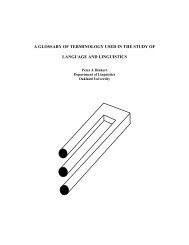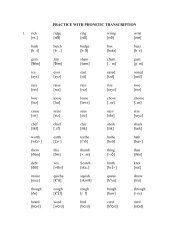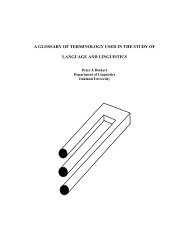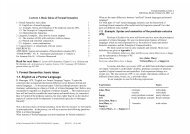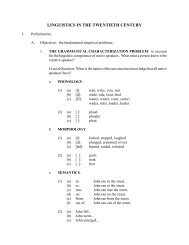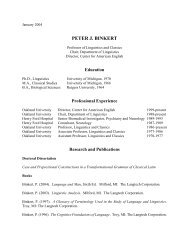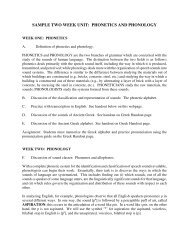- Page 1 and 2: LINGUISTIC STRUCTURES LECTURE NOTES
- Page 5 and 6: PREFACE This book is not a traditio
- Page 7 and 8: TABLE OF CONTENTS Introduction: Lin
- Page 9 and 10: Exercises for Chapter Three .......
- Page 11 and 12: INTRODUCTION: LINGUISTICS AND THE J
- Page 13 and 14: today’s job market. There is also
- Page 15 and 16: complex, interacting issues develop
- Page 17 and 18: circumstances when no single approa
- Page 19 and 20: (8) a. *Them frightened she. b. *He
- Page 21 and 22: In the above illustration, if stude
- Page 23 and 24: is worth noting here that people, i
- Page 25 and 26: like raise, which ends in a [z] (vo
- Page 27 and 28: phonology is exactly what we did wi
- Page 29 and 30: The ability to solve problems, to o
- Page 31: Work with dictionaries (lexicograph
- Page 36 and 37: 26 two. Thus, they know that they c
- Page 38 and 39: 28 1.2 THE STUDY OF GRAMMAR In the
- Page 40 and 41: 30 1.4 LINGUISTIC ARGUMENTATION Lin
- Page 42 and 43: 32 Notice that the three manipulati
- Page 44 and 45: 34 Principle (34) is directly relat
- Page 46 and 47: 36 (36) a. The clause is the major
- Page 48 and 49: 38 generalized principles or rules.
- Page 50 and 51: 40 (47) a. [im] before words beginn
- Page 52 and 53: 42 The significance of the above di
- Page 54 and 55: 44 superficial variations and tend
- Page 56 and 57: 46 (58) Statements Direct Questions
- Page 58 and 59: 48 Sixth, there is no one-to-one co
- Page 60 and 61: EXERCISES FOR CHAPTER ONE 1. What m
- Page 62 and 63: 52 5. Find the words which express
- Page 64 and 65: 54 Can you think of other ways of d
- Page 66 and 67: 56 FIGURE ONE: THE VOCAL APPARATUS
- Page 68 and 69: 58 feature [±ROUND] to distinguish
- Page 70 and 71: 60 MANNER OF ARTICULATION STOP [-VO
- Page 72 and 73: 62 2.1.2.4 NASALS A fourth group of
- Page 74 and 75: FEATURES FIGURE SIX: DISTINCTIVE FE
- Page 76 and 77: 66 [±VOCALIC], [±CONTINUANT], [±
- Page 78 and 79: 68 As these examples show, a syllab
- Page 80 and 81: 70 In examining English, phonologis
- Page 82 and 83: 72 2. [+ASPIRATED] considerable bre
- Page 84 and 85:
74 What the speaker actually says i
- Page 86 and 87:
76 2.3 PHONOTACTICS Further investi
- Page 88 and 89:
78 Morphemes have different phoneti
- Page 90 and 91:
80 Notice that (30) involves a chan
- Page 92 and 93:
82 (32) a. The PST morpheme in Engl
- Page 94 and 95:
84 (45) a. If a suffix and the fina
- Page 96 and 97:
86 Vowels have many redundant featu
- Page 98 and 99:
88 Similarly, silent letters freque
- Page 100 and 101:
90 VOWELS: SUMMARY OF ENGLISH SOUND
- Page 102 and 103:
EXERCISES FOR CHAPTER TWO 1. Transc
- Page 104 and 105:
94 2. Transcribe the following Engl
- Page 106 and 107:
96 runaway Saturday ricochet proté
- Page 108 and 109:
98 h. tense high front unrounded vo
- Page 110 and 111:
100 b. Nontense vowels in the final
- Page 112 and 113:
102 12. Consider the following addi
- Page 114 and 115:
104 weird feared veered cared cord
- Page 116 and 117:
106 3. agree debris ennui Pawnee ma
- Page 118 and 119:
108 APPENDIX B: PHONOLOGICAL RULES
- Page 120 and 121:
110 d. e. 8. a. Nasalize all vowels
- Page 122 and 123:
112 APPENDIX D: PHONOLOGY PROBLEM D
- Page 124 and 125:
114 APPENDIX F: ENGLISH VOWEL SHIFT
- Page 126 and 127:
116 (3) Root /fræg/ ‘break’: a
- Page 128 and 129:
118 talking to and that such a pers
- Page 130 and 131:
120 assertion, that is, it is not s
- Page 132 and 133:
122 We can support this analysis of
- Page 134 and 135:
124 (25) When presenting your hypot
- Page 136 and 137:
126 (37) a. Impressionist painters
- Page 138 and 139:
128 While (42b) appears to be a fai
- Page 140 and 141:
130 structural principles which can
- Page 142 and 143:
132 stewardess if the pilot orders
- Page 144 and 145:
134 (59) a. S ÷ NP + AUX + VP b. V
- Page 146 and 147:
136 distinctions, CONDITIONAL (CND)
- Page 148 and 149:
138 (72) Noun Class Overt Determine
- Page 150 and 151:
140 A possessive pronoun like her i
- Page 152 and 153:
142 (86) a. the new tenor from Ital
- Page 154 and 155:
144 (91) This tree characterizes th
- Page 156 and 157:
146 It is important to note, at thi
- Page 158 and 159:
148 Using syntactic features like t
- Page 160 and 161:
150 We can account for these co-occ
- Page 162 and 163:
152 examine their consequences for
- Page 164 and 165:
154 (123) Notice that, in (123), Sp
- Page 166 and 167:
156 The above representations conta
- Page 168 and 169:
158 (140) S: The people generously
- Page 170 and 171:
160 (143) Prehead NP position. a. t
- Page 172 and 173:
162 Other examples of STRUCTURAL AM
- Page 174 and 175:
164 (154) To solve this problem, we
- Page 176 and 177:
166 Adding a quantifier and adjunct
- Page 178 and 179:
168 Returning to our original examp
- Page 180 and 181:
170 3.12 RESIDENTIAL GRAMMAR (RG) T
- Page 182 and 183:
172 position in syntactic structure
- Page 184 and 185:
174 significance they have in moder
- Page 186 and 187:
176 c. *The kitchen appliance facto
- Page 188 and 189:
178 (194) The Mafia illegally shipp
- Page 190 and 191:
180 Another example of the relation
- Page 192 and 193:
182 The complete RG morphosyntactic
- Page 194 and 195:
184 (203) also makes clear the rela
- Page 196 and 197:
186 The need for three X levels abo
- Page 198 and 199:
188 The three level hypothesis for
- Page 200 and 201:
190 c. The boys made good models. (
- Page 202 and 203:
192 (226) a. John caught Bill. b. *
- Page 204 and 205:
194 3.14 NONTRANSFORMATIONAL GENERA
- Page 206 and 207:
196 Given (238) and (239), we deter
- Page 208 and 209:
198 Native speakers know intuitivel
- Page 210 and 211:
200 (257) THE CONTRACTION BLOCK CON
- Page 212 and 213:
202 read minds. In fact, we can pro
- Page 214 and 215:
204 f. Further examples of particip
- Page 216 and 217:
206 3.16.2 PROBLEMS WITH THE CLASSI
- Page 218 and 219:
208 This do must be distinguished f
- Page 220 and 221:
210 If we treat be as a main verb a
- Page 222 and 223:
212 (307) The boys made good cooks.
- Page 224 and 225:
214 (316) a. Have they done that? b
- Page 226 and 227:
216 (327) a. They could have been a
- Page 228 and 229:
218 3.16.5 PARSES ILLUSTRATING THE
- Page 230 and 231:
220 (340) Present Tense + Perfectiv
- Page 232 and 233:
222 (343) Conditional Tense + Perfe
- Page 234 and 235:
224 (345) Conditional Tense + Perfe
- Page 236 and 237:
226
- Page 238 and 239:
228 4. All of the following sentenc
- Page 240 and 241:
230 9. Draw diagrams for each of th
- Page 242 and 243:
232 d. John reads those magazines.
- Page 244 and 245:
234 3. a. (89) can generate the str
- Page 246 and 247:
236 5. Provide disambiguating diagr
- Page 248 and 249:
238 d. The prisoner of war spoke fo
- Page 250 and 251:
240 d. John reads those magazines.
- Page 252 and 253:
242 8. Draw diagrams for the follow
- Page 254 and 255:
244 9. a. The thief hit the lady wi
- Page 256 and 257:
246 c. The repair man will look up
- Page 258 and 259:
248 e. They hired Spanish teachers.
- Page 260 and 261:
250 7. Rules for Case Marking and R
- Page 262 and 263:
252 5. Noun phrase structure (John
- Page 264 and 265:
254
- Page 266 and 267:
256 its denotative meaning to refer
- Page 268 and 269:
258 (5) AMBIGUITY (one sound, more
- Page 270 and 271:
260 For most speakers of English, t
- Page 272 and 273:
262 (20) POSSESSIVE: the case of th
- Page 274 and 275:
264 Quite frequently in languages,
- Page 276 and 277:
266 4.11 RG SEMANTICS The central h
- Page 278 and 279:
268 (38) a. He ran from his office
- Page 280 and 281:
270 (43) Hindi (same postposition k
- Page 282 and 283:
272 semantics. The descriptions use
- Page 284 and 285:
274 4.13 SOME BASIC FEATURE DISTINC
- Page 286 and 287:
276 (54) a. *It is now off the wall
- Page 288 and 289:
278 Figure Nine reveals an importan
- Page 290 and 291:
280 -DSJ -CNJ +DSJ +CNJ -DSJ +CNJ +
- Page 292 and 293:
282 (66) DIFFERENTIAL (DIF): The de
- Page 294 and 295:
284 (77) COMPONENTIAL2: the part (m
- Page 296 and 297:
286 4.16 PROTOTYPES AND STRENGTH OF
- Page 298 and 299:
288 2. As a manner or condition: RE
- Page 300 and 301:
290 Notice also that the questionin
- Page 302 and 303:
292 wicked problem in the sense men
- Page 304 and 305:
294 4.18 SEMANTIC NETWORKS Semantic
- Page 306 and 307:
296 The link from BIRD-1 to FLY-1 h
- Page 308 and 309:
298 Using this method, determine th
- Page 310 and 311:
300 7. How would CASE GRAMMAR descr
- Page 312 and 313:
302 APPENDIX A: SUMMARY OF THEMATIC
- Page 314 and 315:
304
- Page 316 and 317:
306 (2) PHONOLOGY (see Figure Five
- Page 318 and 319:
308 (6) [X n ([+NML]) ([-NML]) X m
- Page 320 and 321:
310 On the other hand, a parser bas
- Page 322 and 323:
312 the ability of people or machin
- Page 324 and 325:
314 Given (20) and (21), the senten
- Page 326 and 327:
316 (27) N3: (28) V3: a. that vote:
- Page 328 and 329:
318 Notice that each BR, whether a
- Page 330 and 331:
320 (36) Indirect Statement with op
- Page 332 and 333:
322 First, the only noun in a compo
- Page 334 and 335:
324 (52) N3 +))))0)))))))3)))), ...
- Page 336 and 337:
326 (58) a. Ann said that Sue hurt
- Page 338 and 339:
328 As a start, we recognize the fo
- Page 340 and 341:
330 (70) PRINCIPLE 6: A PERSONAL PR
- Page 342 and 343:
332 c. Bob told Ann that Sue liked
- Page 344 and 345:
334 To the principles above, we add
- Page 346 and 347:
336 c. Empty category condition (EC
- Page 348 and 349:
338
- Page 350 and 351:
340 4. SYNTAX. Judgements: ?Questio
- Page 352 and 353:
342 d. Not dependent on intelligenc
- Page 354 and 355:
344 (3) Relevance of word order. (a
- Page 356 and 357:
346 b. Arguments for cerebral later
- Page 358 and 359:
348 2. Syntax. a. [±PREHEAD]; [±P
- Page 360 and 361:
350 c. Justification of units. (1)
- Page 362 and 363:
352 c. Syntactic Representations. (
- Page 364 and 365:
354 2. Ambiguity in Context. a. Lin
- Page 366 and 367:
356 4. Contextual sensitivity. a. L
- Page 368 and 369:
358 c. General characteristics. (1)
- Page 370 and 371:
360 7. Rules. a. Linguistic. (1) Jo
- Page 372 and 373:
362 d. NESTED CONSTRUCTION: phrase
- Page 374 and 375:
364 b. Type Two. (1) Description: t
- Page 376 and 377:
366 d. Controlled by magic words th
- Page 378 and 379:
368 a. Development of the supramarg
- Page 380 and 381:
370
- Page 382 and 383:
372 DEMONSTRATIVE PRONOUNS are used
- Page 384 and 385:
374 MORPHOLOGY Most grammars divide
- Page 386 and 387:
376 SUPPLEMENT THREE (PART I): TYPO
- Page 388 and 389:
378 GERMANIC: SUPPLEMENT FOUR (PART
- Page 390 and 391:
380 SUPPLEMENT FIVE (PART I): LANGU
- Page 392 and 393:
382 SUPPLEMENT FIVE (PART III): IND
- Page 394 and 395:
384 SUPPLEMENT FIVE (PART V): OTHER
- Page 396 and 397:
386 Madurese [IV] Malagasy [IV] Mal
- Page 398 and 399:
388
- Page 400 and 401:
390 (2) TRANSITIVE (DIRECT OBJECT C
- Page 402 and 403:
392 (4) COPULATIVE (PREDICATE COMPL
- Page 404 and 405:
394 (6) INTRANSITIVE WITH PREDICATE
- Page 406 and 407:
396 (8) TRANSITIVE (DIRECT OBJECT +
- Page 408 and 409:
398 b. TRANSITIVE (DIRECT OBJECT +
- Page 410 and 411:
400 (11) TRANSITIVE (DIRECT OBJECT
- Page 412 and 413:
402 (13) TRANSITIVE (DOUBLE OBJECT)
- Page 414 and 415:
404 (15) TRANSITIVE (SENTENTIAL COM
- Page 416 and 417:
406 The clause “I know that man i
- Page 418 and 419:
408 (18) TRANSITIVE (SENTENTIAL COM
- Page 420 and 421:
410 (20) TRANSITIVE (SENTENTIAL COM
- Page 422 and 423:
412 (22) TRANSITIVE (DIRECT OBJECT
- Page 424 and 425:
414 (24) TRANSITIVE (DIRECT OBJECT
- Page 426 and 427:
416 (26) TRANSITIVE (DIRECT OBJECT
- Page 428 and 429:
418 (28) INTRANSITIVE (PREPOSITIONA
- Page 430 and 431:
420 (30) TRANSITIVE (PARTICLE + DIR
- Page 432 and 433:
422 (32) TRANSITIVE (DIRECT OBJECT
- Page 434 and 435:
424 (34) TRANSITIVE (DIRECT OBJECT
- Page 436 and 437:
426 (36) TRANSITIVE (PREPOSITIONAL
- Page 438 and 439:
428 (2) The kitchen appliance facto
- Page 440 and 441:
430 (6) The soprano from a small to
- Page 442 and 443:
432 (2) We believe John to be compl
- Page 444 and 445:
434 SUPPLEMENT ELEVEN: SAMPLE PARSE
- Page 446 and 447:
436 (3) Gerundial Nominals (-ing) a
- Page 448 and 449:
438 SAMPLE PARSES FROM THE LANGTECH
- Page 450 and 451:
440 (7) TRANSITIVE (DIRECT OBJECT +
- Page 452 and 453:
442 The clause "i heard the tenor s
- Page 454 and 455:
444 Brace .........................
- Page 456 and 457:
446 High ..........................
- Page 458 and 459:
448 Nonpositional Thematic Relation
- Page 460 and 461:
450 Second Person .................
- Page 462 and 463:
452 NOTES
- Page 464 and 465:
454 NOTES
- Page 466 and 467:
456 NOTES
- Page 468:
458 NOTES



